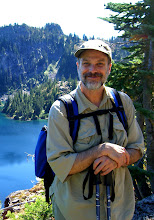Sunday, September 30, 2012
An Open Letter to the Buddhist Community
As a pioneer in translating Buddhist teachings into Western culture, Ken McLeod has shown acute insight and broad knowledge. At the same time he is a human being with reactive patterns and blind spots.
In the matter between Ken and Patricia Ivan: in 2009, teaching and intimacies were mixed in ways that were harmful to both of them. In several private conversations with me during 2011 and 2012, Ken acknowledged that emotional entanglement and physical intimacies had occurred, and he acknowledged it in a conference call attended by Unfettered Mind board member Robert Conrad, myself, and others (May 21, 2012).
Out of concern for those directly involved and for the wider community, I told Ken I would be as discrete as possible but would not participate in a cover-up. I listened and offered advice while Ken struggled to find an ethical and effective response, but he and the Unfettered Mind board have instead offered public silence and private threats, which have further confused the community and multiplied the harm.
What’s been set in motion cannot be resolved by secrecy, scandal, or lawsuits. I understand reluctance and defensiveness. But it’s unfathomably sad that Ken is so recalcitrant to acknowledge the facts, to apologize for mistakes, and to transform the difficulty into something positive and worthy.
There is no pleasure or pride in making these statements or in my own role in events. I could have been more observant, more discerning, more concerned, and more vocal. I apologize for any hurt or harm I have caused, knowingly or unknowingly.
George Draffan
NaturalAwareness.net
September 30, 2012
[*] To explore the complex psychological and ethical dynamics between students and teachers, and the need to create a safe and effective container for spiritual practice, I recommend careful study of "At Personal Risk" by Marilyn Peterson, and "Sex and the Spiritual Teacher" by Scott Edelstein.
Saturday, September 22, 2012
Choices
Buddhists talk about "no-self" but there's no such a thing. "No self" means I am not my body, not my feelings, not my thoughts or emotions. I'm not some thing separate from what I experience, but I'm also not any particular emotion or thought. It also means there is no self separate from others. We are embedded in an unceasing complex web of relationships, conditions, and events. It is not possible not to be part of the complex. It's not possible not to respond. The question in each moment is what is the response that leads to balance and peace and freedom, rather than confusion and suffering. The possibility of self-delusion and self-centeredness is ever-present. So is the possibility of being awake and compassionate. Each moment's choices hinge on the intention and attention we carry at that moment. No control, no escape: just endlessly unfolding conditions, choices, and consequences. May the benefits of my skillful choices be shared by everyone. May the consequences of my unskillful choices be all mine. May everyone be awake, free of confusion and suffering. May everyone be safe, healthy, happy, at peace.
Thursday, September 20, 2012
The Point
The foundation is to practice experiencing sensations, feelings, and thoughts without shutting down, without being overwhelmed, without reacting from confusion or habit. That's shamatha (calm abiding).
So don't regard difficult experiences as contaminating the meditation; they are what we practice with.
As we experience sensations, feelings, and thoughts without grasping, fighting, fleeing, or freezing, we see more clearly the actual nature of experience. That's vipashyana (insight).
Here are some of the ways things are:
- Impermanent.
- Not solid.
- Not independent of causes and conditions.
- Vivid and unceasing, but empty of solidity and permanence.
- Embedded in conditions, but malleable to influence.
- Intention affects our experience and our interactions; look into grasping and generosity, ill-will and kindness.
To know what leads to suffering and what leads to balance and peace and freedom.
To free ourselves and others from the suffering that arises from confusion and turmoil.
Wednesday, September 5, 2012
Looking and letting go
We are not any sensation, feeling, thought, or action. We are subject to the dynamics and consequences of all those, but they are not what we are. What are we? Look again and again, examining and questioning any apparent answer. Whenever we grasp onto and crave any thing or any experience, suffering inevitably arises. Clarifying the nature of experience and self, we let go of increasingly subtle objects. Less grasping, less craving, less suffering for oneself and others. Does it ever end? Keep looking and letting go.
Subscribe to:
Posts (Atom)

